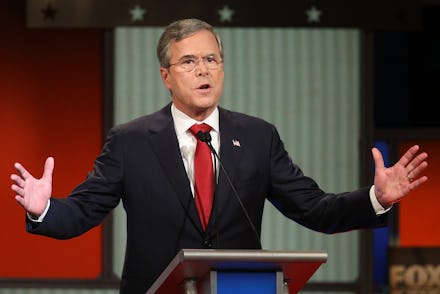Jeb Bush 2016: A Quick Guide to Former Florida Governor’s 2016 Presidential Campaign

Former Florida Gov. Jeb Bush has continued to slip in the national polls among GOP hopefuls, and even with a plethora of endorsements behind him, it doesn't seem likely he can become the third Bush in the Oval Office. It has been a steep decline Bush, one that's the result of several missteps along the campaign trail and the debate floor.
The initial announcement: Bush's campaign went off to a hot start, as he formally announced his campaign in June to a large Miami contingent. According to the New York Times, it was also where he unveiled his logo, "Jeb!" a callback to his failed 1994 race as governor — a sign that he wanted to earn a presidential bid through his own experience, rather than the legacy of his family name.
"Not a one of us deserves the job by right of résumé, party, seniority, family or family narrative," Bush said, according to the Times. "It's nobody's turn. It's everybody's test."
At the time of the announcement, Bush was ahead of all Republican nominees at 12.4%, according to the Huffington Post. In comparison, current GOP frontrunner Donald Trump was polling at 2.7%.
What also helped Bush was his pull to the Latino vote. According to the Miami Herald, Bush regarded his Hispanic wife, Columba Bush, as his "secret weapon," particularly in Florida.
"I have Hispanic children, I have Hispanic grandchildren," Bush said. "I'm part of the community ... I cannot imagine having the same kind of numbers [with Hispanic voters] that Republicans have had in past presidential elections. I think I can do better."
Bush's unseemly remarks: Ironically, it was through Bush's own doing that he began to alienate his best areas of support. In August, during an interview with conservative radio host Bill Bennett, Bush used the term "anchor babies" to describe children born from pregnant illegal immigrants who migrate to America, according to NBC News. In an effort to remedy the situation, he later said he wasn't sure what else to call them, and that it's "more Asian people." It was a slip-up that didn't go unnoticed by Democratic frontrunner Hillary Clinton.
Unfortunately for Bush, that's just the tip of the iceberg. In July, as a means for the country to recover economically he said people needed to work "longer hours" before saying that his words were misinterpreted, according to the Washington Post. Additionally, in August, Bush also said he didn't believe half a billion dollars was needed for women's health issues and that it was overfunded — a remark he later said he "misspoke" on, according to the Hill.
Perhaps worst of all, when talking about the mass shooting in Oregon in October, Bush said "stuff happens" in his remarks, adding that there's "always a crisis," according to CNN. In a tweet about the shooting, Twitter also had a field day.
This constant barrage of errors is succinctly described by Washington Post op-ed columnist Dana Milbank: "When Jeb Bush opens his mouth, danger occurs."
Rubio's ascension: While one Florida-based candidate has struggled, another has, essentially, taken his place. In Florida Sen. Marco Rubio, Bush had someone he once considered a protégé, but has since attempted to slight during speeches and debates. It was — for the two Florida politicians — an inevitable clash of two contrasting candidates.
Rubio and Bush "represent two roads the Republican Party might take to the White House: one, along the familiar Republican route of nominating a party elder; the other, down a path usually taken by Democrats, nominating a young, invigorating candidate who can repackage the party for a new generation of voters," Scott Bixby wrote for Mic.
During the CNBC Republican debate in October, the clash came to the forefront, with Bush citing Rubio's lack of senate attendance as an issue with Rubio's campaigning, as he's missed nearly one-third of roll-call votes on the year. As Vox's Dara Lind described it, the clash was "the equivalent of Darth Vader taking on Obi-Wan Kenobi."
It was an exchange that looked forced on Bush's part, and one that — as a result — blew up in his face, as Rubio suggested that the only reason the former governor attacked him was because he was told it would help his own campaign.
"Bush's attempt to attack Rubio was a metaphor not only for his debate performance but for his campaign," Chris Cillizza wrote for the Washington Post.
Watch the full exchange below:
Bush donor concerns mount: The failure in the debate emphasized what was already a concern for Bush campaign donors: He was becoming a bad investment. According to a Politico report in September, one Bush donor — speaking on the condition of anonymity — said the panic level for the former governor was a "six or seven" on a 10-point scale.
Case in point: Less than a week after the October debate, Bush's national poll numbers slipped even further, as he had 4% support among GOP voters in a Quinnipiac University poll released Nov. 5. Since then, Bush has failed to crack single digits, and even a marginally improved debate showing Thursday can't remedy what's been lost.
Furthermore, in a Politico report Friday, Bush's campaign donors are now waiting for the ship to sink, and some are hoping he will drop out of the race if he performs poorly in the New Hampshire primary. The result will likely be a majority of the donors transitioning to Rubio, who already has the second-most endorsements among Republican candidates, according to FiveThirtyEight's endorsement metrics.
"The sense of these folks is it is so sad," Florida GOP consultant — and Rubio backer — Rick Wilson said, according to Politico. "They whisper to each other, 'When will Jeb go?'"